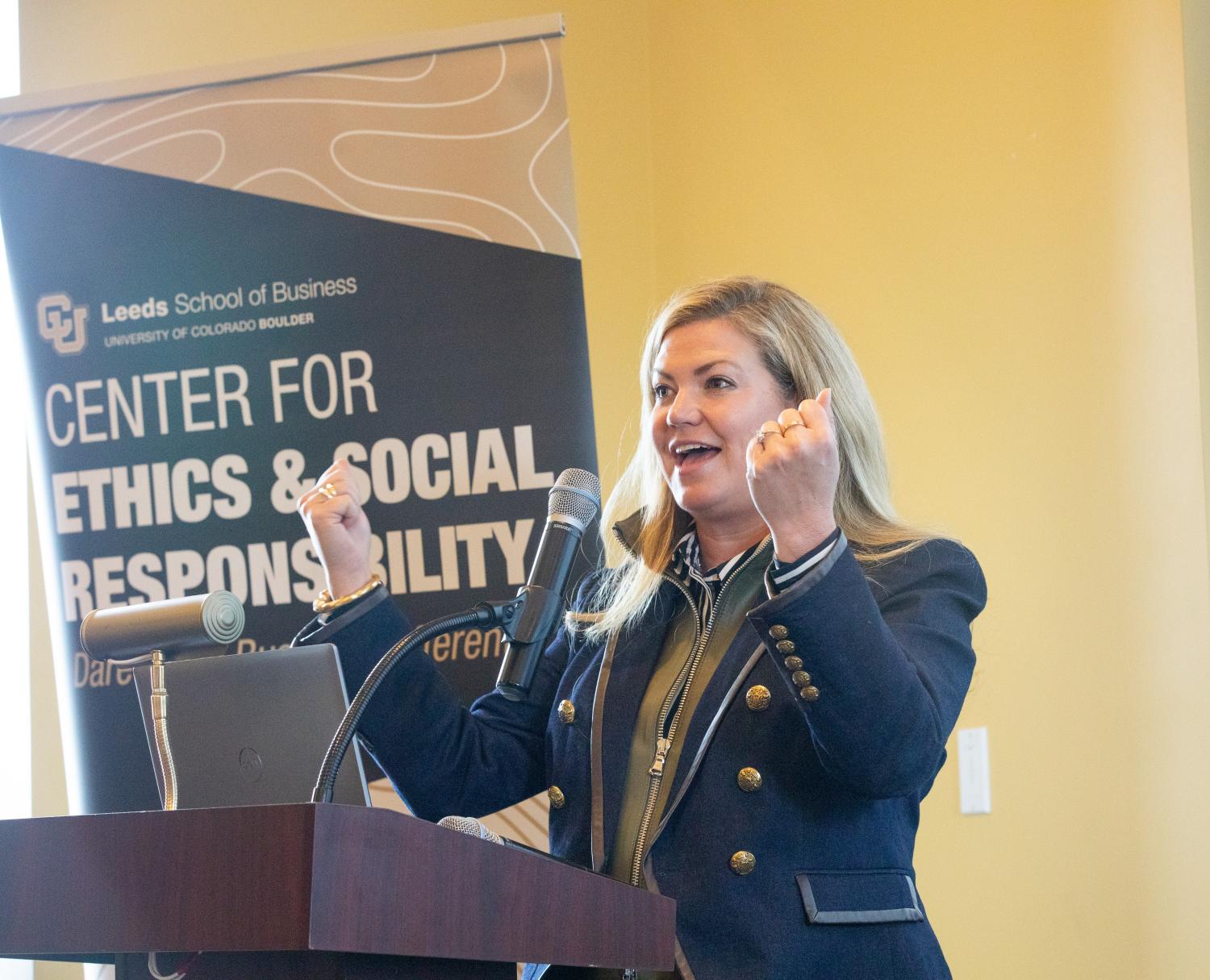New climate initiative to turn student innovations into startup success

Ashley Grosh, CU Boulder alum and vice president at Breakthrough Energy, founded by Bill Gates in 2015, unveils the Leeds School of Business's new initiative, Boulder Climate Ventures. Credit: Cody Johnston
In a major step toward accelerating Colorado’s climate innovation economy, CU Boulder has launched Boulder Climate Ventures, a new interdisciplinary program that equips students to develop and launch high-impact startups focused on climate solutions. The program is supported by Breakthrough Energy, a global initiative focused on advancing climate and energy solutions through innovation and investment.
Led by the Center for Ethics and Social Responsibility (CESR) and the Deming Center for Entrepreneurship at the Leeds School of Business, Boulder Climate Ventures is a graduate-level program that connects students—primarily from business, engineering and science backgrounds—to a growing network of experts, researchers and entrepreneurs tackling sustainability challenges.
Boulder Climate Ventures is the newest addition to Breakthrough Energy’s University Climate Ventures network, joining Stanford University, MIT, Technical University of Munich and Nanyang Technological University in Singapore. CU Boulder is the first U.S. public university to be included in the network—a milestone that reflects the university’s growing leadership in climate innovation, said Andrew Mayock, vice chancellor for sustainability.
“We have the student ingenuity, strong faculty support, cutting-edge research and supportive ecosystem to catalyze the technological transformations the world needs,” Mayock said. “This program is a prime example of where we’re headed as a university and broader community.”
Founded by Bill Gates in 2015, Breakthrough Energy supports promising climate and energy technologies on their path to scale-up. Its platform includes Breakthrough Energy Ventures, a venture fund focused on high-impact startups; Catalyst, which funds first-of-a-kind commercial-scale projects; and Discovery, which supports early-stage innovation through initiatives like the Fellows program and University Climate Ventures. As part of this collaboration, CU students will gain access to Breakthrough Energy’s global network of innovators, mentors and investors—accelerating their ability to bring climate solutions from the lab to the market.
“With Boulder Climate Ventures, we’re advancing a bold vision where innovation, sustainability and interdisciplinary learning converge to create lasting impact,” said Vijay Khatri, Tandean Rustandy Endowed Dean of the Leeds School of Business.
That vision is deeply aligned with CU Boulder’s broader mission, said Bryn Rees, associate vice chancellor for innovation and partnerships.
“Boulder Climate Ventures is a natural extension of CU Boulder’s commitment to harnessing innovation for real-world impact. By supporting interdisciplinary collaboration and fostering the next generation of climate tech entrepreneurs, we are not only addressing critical environmental challenges but also positioning our university as a leader in developing scalable solutions,” Rees said. “Boulder Climate Ventures will complement and integrate with the many other programs at CU Boulder to support all those who wish to build transformative ventures.”
Igniting student startups
Boulder Climate Ventures includes a two-part entrepreneurship course launching in fall 2025.
The first course, “Business Opportunities in Climate Tech,” which is being tailored to enhance CU Boulder’s established innovation network, will explore emerging challenges and innovations in key Mountain West sectors—such as mining, water management, energy, agriculture and wildfire resilience—through a seminar focused on real-world cases and expert insights. The class aims to equip students with the knowledge to identify scalable venture opportunities while building a community of entrepreneurs that will guide team formation for the second part of the course.
The follow up course, called “Climate Tech Venture Discovery,” includes entrepreneurship lectures and guest visits from founders and investors. Students will receive support from climate tech and venture capital advisors and work toward launching a viable company by conducting customer discovery, completing a techno-economic analysis, developing an investor pitch and presenting to external judges.
“We’re creating a low-risk space for students to test climate tech ideas using a proven, market-driven curriculum,” said Katherine Ratledge, program manager at CESR at Leeds. “By building a strong community across CU and the Rocky Mountain region, we’re empowering future climate innovators to turn bold ideas into real-world impact.”
A natural climate hub
“Boulder’s unique mix of culture, talent and research makes it a natural hub for climate innovation”, said Ashley Grosh, vice president at Breakthrough Energy and a CU alum.
“Boulder has all the right building blocks—world-class research, a deep-rooted culture of sustainability and a thriving startup ecosystem,” Grosh said. “We don’t have to build that from scratch. The ecosystem is here. It’s about connecting the dots and fueling momentum.”
CU Boulder has long been a leader in sustainability-focused innovation. The university has launched 44 sustainability-focused spinouts, ranging from companies developing low-carbon building materials to startups using quantum technology to detect and prevent methane leaks from oil and gas operations. This spring, CU Boulder was also awarded $1 million in climate innovation grants through a partnership with Deloitte and broke ground on a 1.1 megawatt solar array on its East Campus as part of its plan to achieve carbon neutrality by 2050.
Organizers say Boulder Climate Ventures is designed to grow with the community and reflect CU’s distinct strengths rather than mirror existing models at other institutions.
“Stanford has its version, MIT has its flavor,” Grosh said. “And this program will reflect CU’s identity. Our hope is that it grows authentically—shaped by CU’s unique strengths and community.”


